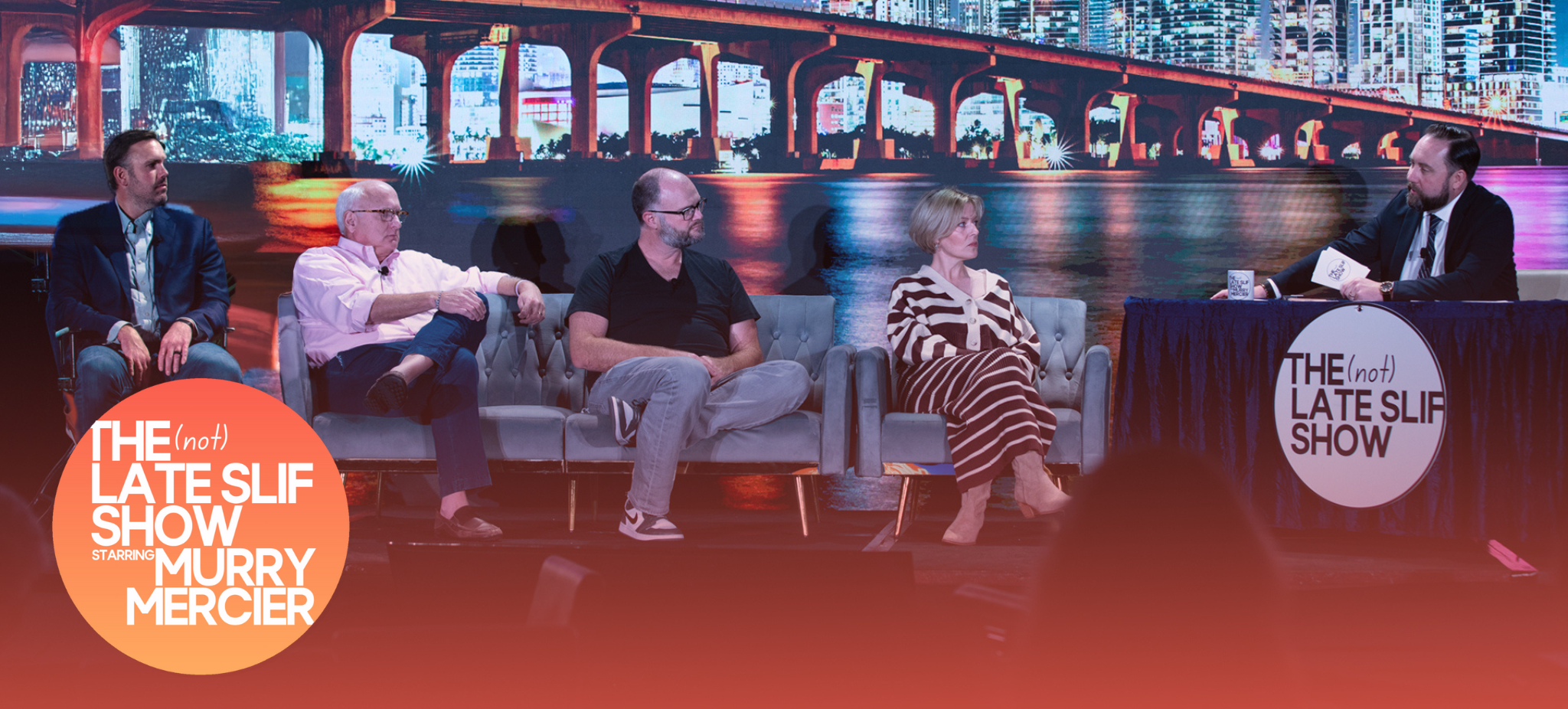
Senior living is undergoing a monumental transformation, with value-based care (VBC) opportunities taking center stage—shifting from reactive service delivery to quality-based outcomes focused on preventative care.
At the recent Senior Living Innovation Forum, we wanted to address this topic in a way that was more engaging than a standard (boring) panel. The solution was to create a talk show format, and thus 'The (not) Late SLIF Show' was born, featuring an excellent host in Murry Mercier (PointClickCare) and sidekick Charles Mann (Accushield). Industry-leading guests Tom Grape, CEO of Benchmark, Andy Eby, President of Bickford Senior Living, and Kim Elliott, Chief Nursing Officer for Brookdale, shared insights on embracing VBC to drive innovation, enhance resident experiences, and tackle industry challenges head-on.
Tom Grape highlighted the critical importance of human connections in senior living. "Nobody writes letters about our beautiful buildings or great food," he shared. "It's the connections our residents form—with staff and each other—that truly transform lives."
Benchmark’s journey into value-based care began with a strategic rollout of electronic health records (EHRs), essential for integration with healthcare systems and ensuring seamless communication. For Grape, this foundational step enables the tracking of outcomes and opens doors to deeper collaboration with healthcare providers.
While some in the industry hesitate due to financial or operational barriers, Grape remains optimistic: “Integration of healthcare and senior living is inevitable—and a positive development.”
For Andy Eby, value-based care is deeply personal. Describing himself as a "caregiver," Eby’s philosophy centers on leading with love, even when the path is tough. The COVID-19 pandemic was a turning point, forcing Bickford Senior Living to reevaluate its operations. "We realized this was our moment to be bold and disruptive," he said.
Eby's mantra, “#Offense,” reflects a proactive approach to health and wellness. Bickford’s culture shift emphasized preventing falls and improving clinical outcomes—laying the groundwork for a more integrated and innovative care model. Collaborations like the Servium Care Network have further empowered Bickford to tackle systemic challenges, bringing together senior living providers to drive collective change.

One standout initiative, "Project Love Meter," leverages technology to connect residents with volunteers based on shared interests. This effort combats loneliness—a significant social determinant of health—while reinforcing the importance of community in senior living.
Kim Elliott of Brookdale Senior Living champions a structured approach to value-based care. Through its HealthPlus program, Brookdale has reimagined senior living community experience, incorporating preventative care, chronic disease management, and real-time health monitoring.
"HealthPlus isn’t just a program—it’s an intentional disruption," Elliott explained. From reducing hospitalizations to extending lengths of stay, the program’s results speak volumes. Yet Elliott stresses that success in VBC requires more than technology or data; it demands a fundamental shift in mindset. “If you see value-based care as just a financial model, you’re missing the point.”
Elliott’s advice for smaller providers is encouraging: "Anyone can do it. Start small, get the basics right, and decide what you want to be. Partner with others if needed, but stay focused on improving care."
Value-based care presents a rare opportunity for senior living providers to redefine their role within the broader healthcare ecosystem. As Elliott points out, residents in senior living communities are among the most challenging—and expensive—to care for. By leveraging data, fostering partnerships, and embracing innovation, senior living can become a key player in improving outcomes and reducing costs.
Yet, as the guests noted, the journey isn’t without obstacles. Many providers still cling to reactive “sick care” models, while others wait to see how early adopters fare. But as Grape aptly put it, “The alternative is becoming a dinosaur—and that’s not where we want to be.”
By 2030, senior living will look vastly different. Whether it’s through collaborative networks, culturally driven initiatives, or cutting-edge technologies, providers must embrace their potential as leaders in health and wellness. As Eby remarked, “We’re not just responding to change; we’re creating it.”
For senior housing providers ready to step up, the time is now. As The (not) Late SLIF Show guests made clear, value-based care isn’t just a strategy—it’s a movement to set new standards and shape the future of the industry.
Watch the premiere episode of The (not) Late SLIF Show below...

A One of a Kind Retreat for Hotel Development, Design & Construction Leaders.
Oct 25-27, 2026 | Fort Lauderdale, FL
Learn more
© Copyright 2025 influence group. All Rights Reserved
Comments